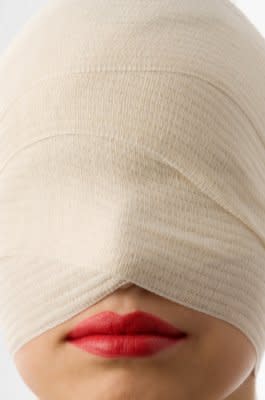The future of anti-aging: now to 2030 and beyond

Another year, another day younger. 2010 was a landmark year in the field of anti-aging. From skin preservation technology to groundbreaking research in life extension, everything old is new again. If it's not, it will be. Here's a look at how we're tapping the fountain of youth now and what's in store for the future.
2010: This year, prospective patients were able to consult with plastic surgeons without leaving home. SurgeonHouseCall.com allowed users to get personalized age reversal plans from one of 80 board certified surgeons. Meanwhile, an Advanced Aging Simulation machine, which can visually map your aging process made its debut in a New Jersey Research facility. Cue Botox. The filler is no longer a stopgap but a preventative measure to protect skin from future wrinkling. In topical breakthroughs, The International Stem Cell Corporation released a much-touted line of wrinkle-reducing products with extracts derived from unfertilized eggs. The line became available worldwide this month, and results sound promising. And don't forget Demi Moore's rumored go-to treatment, Thermage. The skin-tightening process employs radio frequency to tighten collagen and stimulate growth for smoother skin.
2015: With the pharmaceutical industry and even the military pushing for age reversal magic pills, the near future could look a lot younger. Researchers are looking at anti-aging on a cellular level and finding promising results in slowing age-related illnesses. Meanwhile, a drug called resvertrol, derived from a compound in red wine, was found to reproduce the anti-aging affects of a calorie-restricted diet. Some advocates expected it to add 10 healthy years to a life span. It's also been suggested to cure Alzheimer's and treat diabetes. Concern over its effects on the kidney halted progress this year, but don't count it out yet. The $720 million investment from GlaxoSmithKline won't be flushed down the drain. In five years we'll also have more information on testosterone gel, the topical steroid believed to restore libido and general livelihood in aging men. A five-year study into the little-researched product will be concluded and likely open the door for more improvements.
2020: In ten years, we could already be on the path to turning the clock back. New research suggests taking supplements like creatine and ginseng in our 40's can slow the aging process for both the mind and the body. So those who start now, could see real results in a decade.
2030 and beyond: In November, a Harvard study found that altering DNA in mice could actually have a Benjamin Buttons effect. "When the Harvard researchers bred prematurely aged mice and then used a drug to flip on the telomerase gene, the rodents become young again," writes anti-aging expert Arlene Weintraub on the Huffington Post. Unfortunately, it could be decades before it's available for human consumption. That's not all we have to look forward too. One cosmetic surgeon is working on building functional wings that could be surgically implanted in human backs. That would take anti-aging to a macro level, turning contemporary humans into hybrid pterodactyls. Suddenly, Botox doesn't seem so scary.
Related on Shine:
